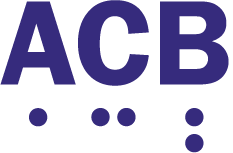About American Council of the Blind
- Home
- About
Fostering Voice, Choice, and Community
Together for
a bright future
The American Council of the Blind (ACB) was founded in 1961 but many of its state affiliates and local chapters have a history that can be traced back to the 1880s.
To increase the independence, security, equality of opportunity, and quality of life for all blind and visually impaired people.
We accept all people who are blind or visually impaired, regardless of their skills or abilities.
We believe that people who are blind or visually impaired should strive to be the best they can be, and we believe that each blind or visually impaired person has the right and responsibility to define success on his or her own terms. Put another way, we do not believe that there is a single “right” way to be blind.
- We believe that it is a fundamental responsibility of government at every level to provide a framework of laws, policies, infrastructure, tools and training that permits people who are blind or visually impaired to participate equally in all aspects of society, including education, employment, civic and spiritual life.
- We believe that a strong national ACB organization exists to establish and promote advocacy priorities and to guide and support our state and special interest affiliates, but we believe in the autonomy of our state and special interest affiliates for determining and acting in accordance with the best interests of their individual members and chapters. Put simply, the ACB national organization exists to meet the needs of our individual members, local chapters, and state and special interest affiliates.


Over $100,000 in scholarships
In 2023, ACB awarded over $100,000 in scholarships to 21 individuals.
Your donation can help fund ACB's wide variety of programs and services to help people who are blind or visually impaired.
History
About American Council of the Blind
The American Council of the Blind (ACB) is comprised of approximately 70 state chapters and special-interest affiliates representing a diverse range of groups within the blind community, including students, families, teachers, attorneys, governmental employees, entrepreneurs, vending stand operators and the LGBTQ community.
Several of these organizations, including the state chapters in Missouri and California, pre-date the founding of the ACB itself. This mix of national, state and local grass-roots organizations has helped ACB to create an organizational culture that values acceptance, peer support, diversity, democracy and direct action.
History
Our Advocacy
National Advocacy Efforts
Our national advocacy efforts have included:
- Active involvement in the development of the principles and policies that served as the foundation for the regulations implementing Section 504 of the Rehabilitation Act of 1973 as amended.
- Collaborating with other disability organizations on the passage and protection of the Americans with Disabilities Act (ADA) and other similar pieces of access legislation.
- Development of standards for accessible technology which has revolutionized the workplace and which ultimately led to the promulgation of Section 508 of the federal Rehabilitation Act.
- Works closely with the Federal Communications Commission and industry leaders following the passage of the 21st Century Communications and Video Accessibility Act (CVAA), which provides for enhanced access to mobile phones, television programming menus, video description of television programming, and access to emergency information displayed on television.
- Ongoing efforts to reform social security in order to create more work incentives for people who are blind or visually impaired, and to ensure that an early return to work does not result in the immediate loss of health care.
- Advocacy which resulted in the expansion of the Randolph-Sheppard Program, which has created meaningful employment and economic security for thousands of blind and visually impaired restaurant, café and vending stand owners across America.
- Working with the Rehabilitation Services Administration to ensure that the rehabilitation services provided to blind and visually impaired Americans by each state and territory are appropriate and effective.
- Working with the Department of Education to ensure that blind children receive the instruction they need to excel in school.
- Working with the federal Bureau of Engraving and Printing to create accessible paper currency that can be independently identified by people who are blind or visually impaired
Partnering with Rehabilitation Service Agencies and Providers
The ACB determined that we could have more influence over how services are delivered by working directly with service providers.
- We maintain ongoing efforts to create and implement programs that will lead to accreditation for agencies who provide services to people who are blind or visually impaired.
- We have served on the boards of directors of national organizations such as National Industries for the Blind, the National Accreditation Council of Agencies Serving People Who Are Blind and the American Foundation for the Blind, and we have used our influence to shape the policies those organizations have developed.
- We have championed the provision of services to people who are blind or visually impaired through separate agencies who have expertise in areas such as access technology, braille, daily living and orientation and mobility, thereby ensuring that people who are blind receive the specialized services they need to be successful.
Legal Advocacy
The ACB has an unswerving resolve to ensure that governments, businesses, employers and other individuals comply with the hard-won laws that protect the rights of people who are blind or visually impaired to participate fully in all aspects of American society. We prefer to advocate through the use of techniques such as direct advocacy, structured negotiations and mediation to address the access rights of people who are blind or visually impaired, but we have also filed law suits when other advocacy approaches did not work. Taken together, these efforts have led to:
- Public transit agencies providing audible announcements on buses, trains and subways.
- Municipalities installing Accessible Pedestrian Signals making it safe for people who are blind or visually impaired to independently cross streets.
- States providing voting machines that allow people who are blind to vote privately and independently.
- The state of Hawaii opening its borders to people who use guide dogs without the requirement of a lengthy, costly and unnecessary quarantine.
- Banks and other businesses providing Point of Sale (POS) credit and debit card processing devices that allow for people who are blind to conduct their business independently and privately.
- We are working with leading developers of mainstream technology to ensure that new and emerging technologies (many of which are highly complex and graphical) are accessible for and usable by people who are blind or visually impaired.
- Throughout our history, we have partnered with other organizations on civil rights issues because we understand that whether discrimination is based on disability, gender, age, race, ethnicity, sexual orientation or any other factor, it is discrimination and must be eliminated.


